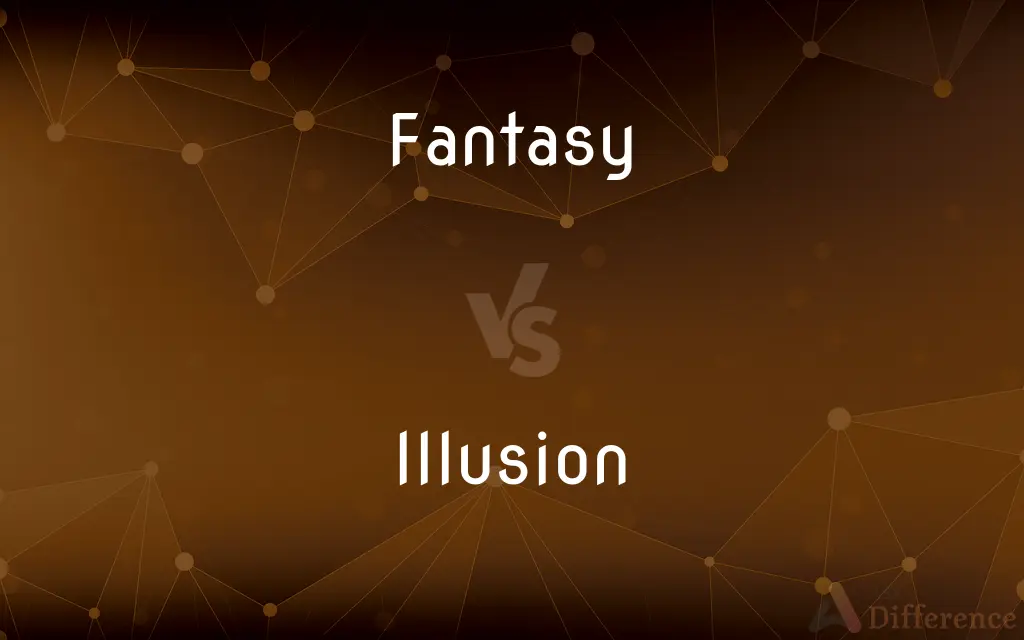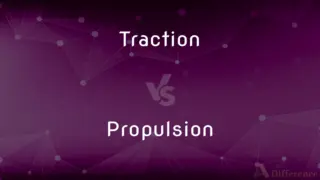Fantasy vs. Illusion — What's the Difference?
By Fiza Rafique & Maham Liaqat — Updated on April 3, 2024
Fantasy involves creative imagination producing elaborate fiction, whereas illusion refers to false perceptions or misconceptions of reality.

Difference Between Fantasy and Illusion
Table of Contents
ADVERTISEMENT
Key Differences
Fantasy is the faculty or activity of imagining impossible or improbable things, often creating vast, intricate worlds in literature and art. On the other hand, illusion primarily deals with the senses, leading one to perceive something that is not present or is distorted from reality.
Fantasy literature and media often involve intricate world-building, including unique creatures, magical systems, and complex lore. Whereas illusions are more about tricking the perception, making people see or believe in things that aren't actually there, such as optical illusions or magic tricks.
Fantasy serves as an escape from reality, offering readers and viewers an experience outside the mundane aspects of life. Illusion, however, can occur in everyday life, subtly altering one's perception of the world around them, often without the active creation or participation of the person experiencing it.
Fantasy can be a deliberate creation, often used in storytelling to explore themes, emotions, and human experiences in a setting unbound by the laws of our reality. Illusions, in contrast, can be unintentional and natural, arising from the brain's interpretation of sensory information.
Fantasy worlds are crafted with the intention of immersion, allowing for exploration of the impossible. Illusions, however, are often fleeting and serve as reminders of the limitations and vulnerabilities of human perception.
ADVERTISEMENT
Comparison Chart
Definition
The creative imagination of improbable worlds.
A false perception or misconception of reality.
Purpose
To entertain and explore thematic concepts.
To deceive the senses or the mind.
Occurrence
Deliberately crafted in art and literature.
Naturally occurs or is intentionally created.
Engagement
Requires active imagination and suspension of disbelief.
Often happens passively, without effort from the observer.
Relation to Reality
Completely detached, offering an escape.
Distorts or misinterprets actual sensory information.
Compare with Definitions
Fantasy
A genre of speculative fiction involving magical elements.
Harry Potter introduces readers to a fantasy world of wizards and magical creatures.
Illusion
A deceptive appearance or impression.
The magician's act was based on creating an illusion of disappearing objects.
Fantasy
An imaginative concept or scenario.
It's a fantasy of mine to sail around the world.
Illusion
A false idea or belief.
The notion of perpetual happiness is an illusion.
Fantasy
A mental escape from reality.
Daydreaming is often a fantasy to escape mundane tasks.
Illusion
A perception that misleadingly represents reality.
Oasis mirages in deserts are natural illusions.
Fantasy
Creative imagining of unlikely scenarios.
The novel's fantasy world is meticulously detailed.
Illusion
Optical phenomena that deceive the senses.
The illusion made the straight lines appear curved.
Fantasy
A form of literary and artistic expression.
The artist's work is known for its fantasy landscapes.
Illusion
A trick of the mind or senses.
His confidence was merely an illusion to mask his insecurity.
Fantasy
Fantasy is a genre of speculative fiction set in a fictional universe, often inspired by real world myth and folklore. Its roots are in oral traditions, which then became fantasy literature and drama.
Illusion
An illusion is a distortion of the senses, which can reveal how the human brain normally organizes and interprets sensory stimulation. Although illusions distort our perception of reality, they are generally shared by most people.Illusions may occur with any of the human senses, but visual illusions (optical illusions) are the best-known and understood.
Fantasy
The faculty or activity of imagining impossible or improbable things
His researches had moved into the realms of fantasy
A fantasy world
Illusion
An erroneous perception of reality
Mirrors gave the illusion of spaciousness.
Fantasy
A fantasia.
Illusion
An erroneous concept or belief
The notion that money can buy happiness is an illusion.
Fantasy
Imagine the occurrence of; fantasize about
It is ludicrous to fantasy ‘disinventing’ the hydrogen bomb
Illusion
The condition of being deceived by a false perception or belief
Spent months flailing about in illusion.
Fantasy
The creative imagination; unrestrained fancy.
Illusion
Something that is erroneously perceived or construed
The animal in the shadows turned out to be an illusion.
Fantasy
Something, such as an invention, that is a creation of the fancy.
Illusion
A fine transparent net fabric, used for dresses or trimmings.
Fantasy
A capricious or fantastic idea; a conceit.
Illusion
(countable) Anything that seems to be something that it is not.
We saw what looked like a tiger among the trees, but it was an illusion caused by the shadows of the branches.
Using artificial additives, scientists can create the illusion of fruit flavours in food.
Fantasy
A genre of fiction or other artistic work characterized by fanciful or supernatural elements.
Illusion
(countable) A misapprehension; a belief in something that is in fact not true.
Jane has this illusion that John is in love with her.
Fantasy
A work of this genre.
Illusion
(countable) A magician’s trick.
Fantasy
An imagined event or sequence of mental images, such as a daydream, usually fulfilling a wish or psychological need.
Illusion
(uncountable) The state of being deceived or misled.
Fantasy
An unrealistic or improbable supposition.
Illusion
An unreal image presented to the bodily or mental vision; a deceptive appearance; a false show; mockery; hallucination.
To cheat the eye with blear illusions.
Fantasy
(Music) See fantasia.
Illusion
Hence: Anything agreeably fascinating and charming; enchantment; witchery; glamour.
Ye soft illusions, dear deceits, arise!
Fantasy
A coin issued especially by a questionable authority and not intended for use as currency.
Illusion
A sensation originated by some external object, but so modified as in any way to lead to an erroneous perception; as when the rolling of a wagon is mistaken for thunder.
Fantasy
(Obsolete) A hallucination.
Illusion
A plain, delicate lace, usually of silk, used for veils, scarfs, dresses, etc.
Fantasy
Relating to or being a game in which participants act as owners of imaginary sports teams whose personnel consists of actual players selected from a professional sports league and team performance is determined by the combined statistics of the players.
Illusion
An erroneous mental representation
Fantasy
To imagine; visualize.
Illusion
Something many people believe that is false;
They have the illusion that I am very wealthy
Fantasy
That which comes from one's imagination.
Illusion
The act of deluding; deception by creating illusory ideas
Fantasy
(literature) The literary genre generally dealing with themes of magic and the supernatural, imaginary worlds and creatures, etc.
Illusion
An illusory feat; considered magical by naive observers
Fantasy
A fantastical design.
Fantasy
(slang) The drug gamma-hydroxybutyric acid.
Fantasy
To fantasize (about).
Fantasy
(obsolete) To have a fancy for; to be pleased with; to like.
Fantasy
(transitive) To imagine; to conceive mentally.
Fantasy
Fancy; imagination; especially, a whimsical or fanciful conception; a vagary of the imagination; whim; caprice; humor.
Is not this something more than fantasy ?
A thousand fantasiesBegin to throng into my memory.
Fantasy
Fantastic designs.
Embroidered with fantasies and flourishes of gold thread.
Fantasy
To have a fancy for; to be pleased with; to like; to fancy.
Which he doth most fantasy.
Fantasy
Imagination unrestricted by reality;
A schoolgirl fantasy
Fantasy
Fiction with a large amount of fantasy in it;
She made a lot of money writing romantic fantasies
Fantasy
Something many people believe that is false;
They have the illusion that I am very wealthy
Common Curiosities
How do illusions affect perception?
Illusions can alter perception by tricking the brain into interpreting sensory information in a way that does not align with reality.
What is an illusion?
An illusion is a distorted perception, leading one to see, hear, or believe something that is not true or does not exist.
What role do illusions play in psychology?
In psychology, illusions can shed light on how the human mind perceives reality, highlighting the complexities of sensory processing and perception.
How do video games utilize fantasy?
Video games often employ fantasy to create immersive worlds and narratives that allow players to experience adventures beyond the possible.
Is fantasy always fictional?
Yes, fantasy is inherently fictional, as it involves elements and scenarios that are not possible within the confines of the real world.
Are fantasies beneficial?
Fantasies can be beneficial as a form of escapism, creativity, and exploration of themes and ideas outside the realm of reality.
How are fantasies created?
Fantasies are created through the imagination, often drawing on elements of myth, folklore, and speculative fiction to construct new worlds and stories.
Do all cultures have fantasies?
Yes, all cultures create fantasies, often reflecting their own myths, legends, and values through storytelling and art.
What is fantasy?
Fantasy is the imaginative creation of worlds and stories, often featuring magical elements and otherworldly creatures, providing an escape from reality.
Can illusions be intentional?
Yes, illusions can be intentionally created, such as in magic tricks or optical illusion art, to deceive the senses or the mind.
How do fantasy and illusion differ in literature?
In literature, fantasy involves creating entire worlds or scenarios beyond the bounds of reality, while illusion might be used as a narrative device to challenge characters' perceptions.
Are illusions always visual?
No, illusions can affect all senses, including auditory illusions (hearing things differently than they are) and tactile illusions (feeling things that aren't there).
What scientific principles explain illusions?
Illusions are often explained by principles of psychology and neuroscience, detailing how our brains process and interpret sensory information.
Can fantasies have a basis in reality?
While fantasies are primarily imaginative, they can be inspired by real-world cultures, history, and natural phenomena, grounding their stories with a sense of realism.
Can illusions be harmful?
While often harmless, illusions can be harmful if they lead to misinterpretation of important information or cause one to make poor decisions based on false perceptions.
Share Your Discovery

Previous Comparison
Traction vs. Propulsion
Next Comparison
Expiation vs. PropitiationAuthor Spotlight
Written by
Fiza RafiqueFiza Rafique is a skilled content writer at AskDifference.com, where she meticulously refines and enhances written pieces. Drawing from her vast editorial expertise, Fiza ensures clarity, accuracy, and precision in every article. Passionate about language, she continually seeks to elevate the quality of content for readers worldwide.
Co-written by
Maham Liaqat















































